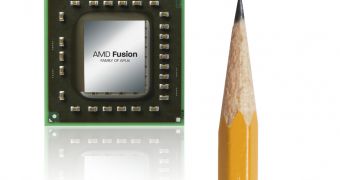Expected to arrive in the first part of 2012, Deccan, the successor of the AMD's current Brazos platform, has been reportedly canceled by the company who will rely on the recently leaked Brazos 2.0 APUs for its future low-power and ultra-portable devices.
News about Brazos 2.0 popped up online just the last month when it fueled a series of speculations about the cancellation of the Deccan platform.
These rumors seem to have been confirmed now by the SemiAccurate website, which has found out that AMD's Wichita and Krishna APUs were indeed canceled.
The reason given by the publication was Globalfoundries' delay of its 28nm fabrication process, but this is somewhat unlikely as both of these APUs were supposed to be produced by TSMC which has already started volume production of 28nm parts.
Whatever the real reason behind this decision, Brazos 2.0 will have to hold the ground for AMD until the Kerala platform arrives in 2013.
From last month's leak we know that Brazos 2.0 lineup will actually include two APUs, the E2-1800 and E1-1200.
The former is a slightly improved version of the current E-450 accelerated processing unit launched earlier this year and it packs the same two computing cores as its predecessor, but with a 1.7GHz base clock speed and a slightly higher clocked GPU.
The AMD E1-1200 on the other hand has been designed to take the place of the E-300 and will feature a 100MHz frequency increase to work at 1.4GHz, and a Radeon HD 7310 on-die GPU that features an insignificant 12 MHz overclock compared to its predecessor.
As far as the 2013 Kerala platform is concerned, information is scarce at this point in time, but it will most probably use a system-on-a-chip (SoC) design, with the Kabini APU being based on the AMD Jaguar CPU core architecture with support for DDR3 memory.

 14 DAY TRIAL //
14 DAY TRIAL //